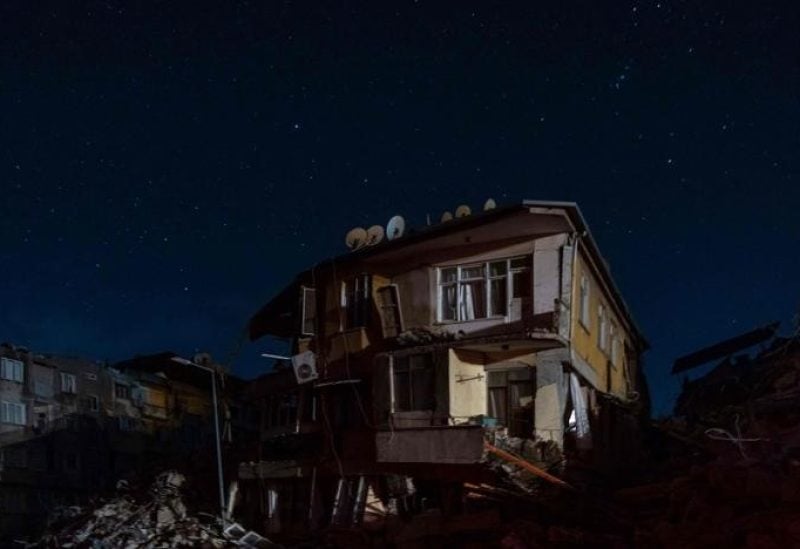
This photograph shows a partially damaged building in Antakya, southern Türkiye on February 20, 2023, after a 6,4-magnitude second earthquake hit the Hatay province in southern Türkiye, in Antakya, on February 20, 2023, two weeks after a 7,8-magnitude one hit the first time the same region. (AFP)
Six people were killed in the latest earthquake to strike the border region of Türkiye and Syria, authorities said on Tuesday, two weeks after a large tremor killed more than 47,000 people and damaged or destroyed hundreds of thousands of homes.
Monday’s quake of magnitude 6.4 was centered near the Turkish city of Antakya and was felt in Syria, Egypt and Lebanon.
It was followed by 90 aftershocks, Türkiye’s Disaster and Emergency Management Authority (AFAD) said, even as rescue work from the initial tremors on Feb. 6 have been winding down.
“I thought the earth was going to split open under my feet,” said Muna Al Omar, holding her seven-year-old son. She now lives in a tent in a park in Antakya after the first quakes forced her from her home.
The Hatay provincial governor’s building, damaged by the first quakes, collapsed in the latest tremor, television footage showed. Six thousand more tents were sent to the area overnight.
President Recep Tayyip Erdogan’s government has faced criticism over what many Turks said was a slow emergency response to the first quake and over construction policies that meant thousands of apartment buildings crumbled on victims when disaster struck.
Erdogan, in power for two decades, faces presidential and parliamentary elections in May, although the disaster could prompt a delay. Even before the tremors, opinion polls showed he was under pressure from a cost of living crisis, which could worsen as the disaster has disrupted agricultural production.
He has promised a swift reconstruction effort, although experts say it could be a recipe for another disaster if safety steps are sacrificed in the race to rebuild.
Turkish Health Minister Fahrettin Koca said 294 people had been injured in the latest quake, adding that patients were evacuated from some health facilities that had remained in operation after the first quakes, as buildings cracked.
In Samandag, where AFAD reported one person dead on Monday, residents said more buildings collapsed, although most people had already fled the town. Mounds of debris and discarded furniture lined the dark, abandoned streets.
‘As long as it takes’
AFAD said the death toll in Türkiye from the Feb. 6 disaster had reached 41,156 and was expected to climb, while 385,000 apartments were known to have been destroyed or damaged.
US Secretary of State Antony Blinken said in Türkiye on Monday that Washington would help “for as long as it takes”. The US State Department said US humanitarian assistance for Türkiye and Syria had reached $185 million.
Governments from around the world have pledged assistance.
The United Nations said the earthquake survivors included about 226,000 pregnant women in Türkiye and 130,000 in Syria, with about 39,000 due to deliver in the next month.
Many now live in camps in freezing conditions and with limited access to food and clean water.
In Syria, already shattered by more than a decade of war, most deaths have been in the northwest, where the United Nations said 4,525 people were killed. The area is controlled by opposition factions at war with President Bashar al-Assad.
Syria said 1,414 people were killed in areas under government control.
Medical charity Medecins Sans Frontieres (MSF) said 14 trucks with aid had entered northwestern Syria from Türkiye on Sunday. As of Monday morning, the United Nations said 197 trucks with UN aid had entered via two border crossings.
The World Food Program has been pressing the authorities to allow aid to pass from government-controlled areas.
Thousands of Syrian refugees in Türkiye have returned to their homes in northwest Syria to contact relatives caught up in the disaster or sending family members back to Syria after their homes in Türkiye were destroyed.
At the Turkish Cilvegozu border crossing, hundreds of Syrians lined up starting early on Monday to cross.
Mustafa Hannan, a 27-year-old Syrian, dropped off his pregnant wife and three-year-old son at the crossing to Syria, after their home in Antakya collapsed.
“I’m worried they won’t be allowed back,” he said. “If I rebuild here but they can’t return, my life will be lost.”